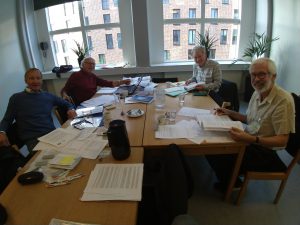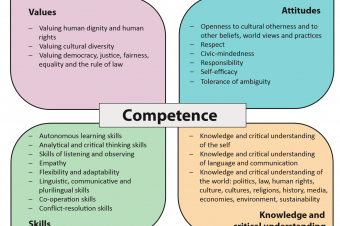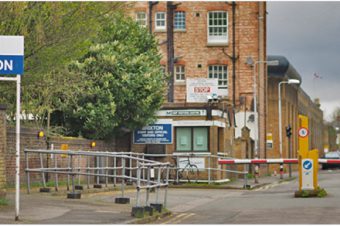November 2018 – Copenhagen
Four of EPEA’s legends recently met in Copenhagen to strategize the writing of the history of prison education. As we all know, the first real EPEA Steering Committee was formed after the acceptance of the constitution at the conference in Sigtuan, Sweden in 1993. But how did it come about? What drove the first steering committee to organise members and define a constitution in the first place?
 Kevin Warner, founding member of the EPEA, reports: “Four of us met over two days on 7th and 8th of November in Copenhagen, where the Danish Prison Service kindly offered us meeting facilities. Copenhagen seemed the best location for the four involved at this stage of the project: Torfinn Langelid from Norway, Svenolov Svensson of Sweden, Kaj Raundrup of Denmark and me, Kevin Warner of Ireland.
Kevin Warner, founding member of the EPEA, reports: “Four of us met over two days on 7th and 8th of November in Copenhagen, where the Danish Prison Service kindly offered us meeting facilities. Copenhagen seemed the best location for the four involved at this stage of the project: Torfinn Langelid from Norway, Svenolov Svensson of Sweden, Kaj Raundrup of Denmark and me, Kevin Warner of Ireland.
We were all closely involved in the formation and development of the EPEA in the early years – although others were also, and it is hoped to draw on their knowledge and experience at a later stage. The aim of this group is to write a concise history of the early years of the EPEA, to explain how the organisation came about, how the Council of Europe report that lies behind it came about, and especially to describe the thinking and values behind these developments. That thinking related to penal policy (a certain progressive view of imprisonment) and adult education.
We have already written quite a bit, but over those two days in Copenhagen we set out a plan to develop that text; we have in mind to meet again for a day next April in the hope of finalising a full draft text. We will circulate that widely seeking comments and clarifications. Then, the hope is that we can meet briefly once more in May to finalise the account.
The initiative for all this came from Torfinn Langelid, who has already written a 400 page history of education in prison in Norway – but we are thinking of an EPEA history of more modest size, but still hopefully of great interest to all involved in education in prison.”
When asked how Kevin envisions prison education in 2050, he replies:
“In 2050, I’d love to think we wouldn’t have any prisons. If we do have any, I hope very few will be held in them, and I hope all who are incarcerated would be treated humanely and have access to good adult education geared to their needs and interests.”
by webeditor




